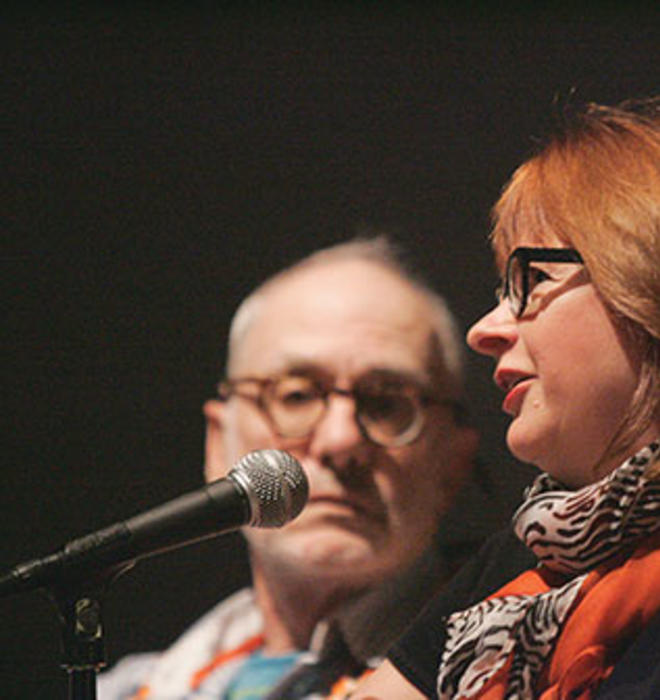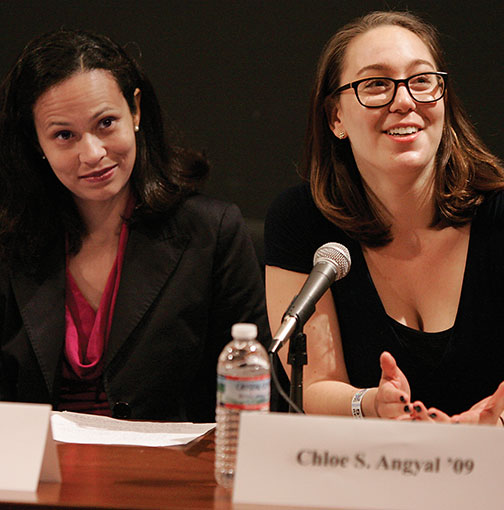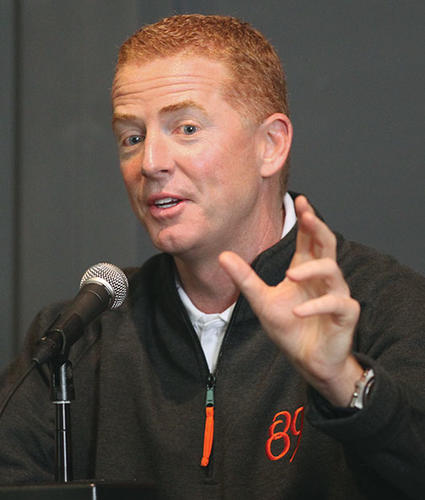
Alumni-Faculty Forums
Adam S. Gussow ’79 *00 had his “crisis moment” at his 10th reunion in 1989, searching for a response to the inevitable question: What are you doing? He was a poorly paid, part-time blues-harmonica teacher, a street musician and grad-school dropout. Today Gussow is an associate professor at the University of Mississippi, but he’s still — and probably always will be — playing the blues. At a Reunions panel called “Life After Princeton: Roads Less Traveled,” Gussow and three other alumni reflected on their unconventional life journeys.
After working in retail and for a financial-software firm, Nancy Herkness Theodorou ’79 became a romance novelist. “Writing brought me joy,” she said; she gets “very grumpy” when she can’t write. Peter Kaminsky ’69, a student activist at Princeton, “fell into” a job at National Lampoon, where he became managing editor; later he began writing about the outdoors, fly-fishing, and food. Both acknowledged that it’s not always easy to follow your passion: Theodorou could pursue her writing because her husband supported the family financially, and journalism jobs like the ones Kaminsky had can be hard to find today.
But there’s hope, regardless of age, suggested Martin E.P. Seligman ’64, a professor of positive psychology and director of the Positive Psychology Center at the University of Pennsylvania. He advised people to follow personality “strengths” — such as kindness, humor, and gratitude — instead of their talents. “People find at midlife very often, having pursued what their talents were, that life is barren.” He suggested identifying strengths and recrafting your job — and your life — around them. By Katherine Federici Greenwood
Panelists at Friday morning’s discussion on “Should Women Do It All?” looked out at their audience and asked a common question: Where were the men? Dodds Auditorium was packed, yet only a handful of men were to be seen. The panel was all female, as well.
To find ways to help women balance their lives at home and in the workplace, “we have to bring men into the picture,” said Ann J. Morning *04, a sociology professor at New York University. Without that, she said, “it’s like trying to address racial inequality in the United Sates by getting a bunch of black people together and telling them to ‘lean in.’ ”
The panel’s topic has become almost a standard on Reunions agendas — one audience member noted that it’s been under discussion for about 40 years. “I’m waiting for tomorrow’s panel on ‘Should Men Do It All,’” said Chloe Angyal ’09, senior editor at Feministing.com, drawing laughter.
This year, the panelists told of their own experiences — of the exhaustion felt in trying to be the best both at home and at work, of caregiving responsibilities for children and parents, of the need to prioritize time for oneself. “In answer to the question, ‘Should women do it all?’: Absolutely,” said Juanita James ’74, who has held top positions in both the corporate and nonprofit worlds. “But you can’t do it with equal intensity or at the same time.” By Marilyn H. Marks *86
The NFL reigns as America’s pre-eminent sports league, but that position is far from guaranteed, longtime Sports Illustrated writer and editor Peter Carry ’64 said in an alumni-faculty forum on the business and management of professional sports teams. Concerns about the long-term effects of concussions could shrink football’s popularity and, Carry said, “If I were an owner in the NFL, or if I was running a big-time college football program, I’d be worried [in the long-term] about where my players are going to come from.”
Minnesota Vikings owner and president Mark Wilf ’84, a fellow panelist, acknowledged that the concussion issue is important to the league’s leaders. “There’s a great sense of responsibility to not just keep the game entertaining but to keep it safe, to keep the youth engaged with the sport,” he said.
The panel, which also featured Dallas Cowboys head coach Jason Garrett ’89, answered a range of audience questions about football, but the highlight of the hour may have been Garrett’s story about a freshman-year psychology class that, like the panel, met in McCosh 10. Garrett and his friends sat in the balcony, until they realized that Brooke Shields ’87 was in the front row. The next time the class met, Garrett and his friends were in the front row, too. “We were like the gum on the bottom of Brooke Shields’ shoe for about two days,” he laughed, “and finally said ‘the hell with it,’ and went back up.” By Brett Tomlinson








No responses yet